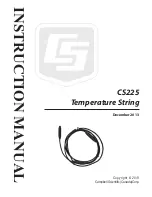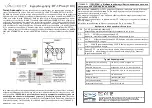
Manual-3
REAR PANEL DESCRIPTION
1. CHANNEL 1 INPUT.
These connectors deliver signal to both Channel 1 of the processor and to the crossover circuit.
2. CHANNEL 1 / LOW PASS OUTPUT.
These connectors deliver signal from Channel 1’s processing circuitry and repre-
sents the low pass portion of the signal when the CROSSOVER ENGAGE switch (7) is in the
in
position.
3. CHANNEL 2 INPUT.
This connector delivers signal to Channel 2’s processor only. It is disconnected when the CROSS-
OVER ENGAGE switch (7) is in its
in
position.
4. CHANNEL 2 / HIGH PASS / COMBINED OUTPUT.
This connector makes the signal from Channel 2 available to the
outside world and is the high pass portion of the audio when the CROSSOVER ENGAGE switch (7) is in its
in
position. If
the SEPARATE / COMBINE switch (8) is in the COMBINE position, this output produces the sum of Channels 1 & 2 and
its overall level is controlled by CH 2 OUTPUT LEVEL.
5. SIDE-CHAIN.
Inserting a ¼" TRS plug into this jack breaks the input signal path to both the Compressor and Gate control
circuit. Inserting an equalizer in this loop enables greater compression of boosted equalizer frequencies. The standard
convention is used of TIP=SEND & RING=RETURN.
6. INPUT GAIN TRIM switch.
In its +4 dBu position, the input gain of the respective Channel is unity. In the -10 dBV
position, the input gain is increased by 12 dB (although mathematically suspicious, it really is 12 dB, not 14 dB) to com-
pensate for certain recording devices. This switch must be in the +4 dBu position for front panel calibration accuracy.
7. CROSSOVER ENGAGE switch.
In its
in
position, this switch places the low pass portion of the audio signal on the CH 1/
LOW OUT jack, and the high pass portion on CH 2/HIGH/COMBINE OUT.
8. SEPARATE / OUTPUT COMBINE switch.
In the COMBINE mode, the outputs of Channel 1 and Channel 2 are added
together and delivered to the CH 2/HIGH/COMBINE OUT connector. This feature is supplied to allow an input to be split
by the crossover, high pass and low pass delivered to separate processor channels, and recombined at the output of the unit.
The COMBINE mode has no effect on the output of Channel 1.
9. Remote POWER supply input.
The DC 24 is supplied from the factory with a Model RS 1 Remote Power Supply suitable
for connection to this input jack. The power requirements of the DC 24 call for an 18-24 volt AC center-tapped transformer
only.
This is not a telephone jack. Never use a power supply with your DC 24 other than the one supplied or an exact
replacement obtained from Rane Corporation.
Using any other type of supply may damage the unit and void the warranty.
10. Chassis ground point.
A 6-32 screw is used for chassis grounding purposes. See the CHASSIS GROUNDING note below.
CHASSIS GROUNDING
If after hooking up your system it exhibits excessive hum or buzzing, there is an incompatibility in the grounding
configuration between units somewhere. Your mission is to discover how your particular system wants to be grounded.
Here are some things to try:
1. Try combinations of lifting grounds on units that are supplied with ground lift switches or links.
2. If your equipment is in a rack, verify that all chassis are tied to a good earth ground, either through the line cord
grounding pin or the rack screws to another grounded chassis.
3. Units with outboard power supplies, such as the DC 24, do not ground the chassis through the line cord. Make sure
that these units are grounded either to another chassis which is earth grounded, or directly to the grounding screw on an AC
outlet cover by means of a wire connected to a screw on the chassis with a star washer to guarantee proper contact. If you
are connecting the DC 24 outputs directly to a power amplifier, be sure to connect a ground wire to the amplifier chassis.
Refer to RaneNote 110, “Sound System Interconnection” (supplied in this manual) for further grounding information.
www.audiovias.com






















